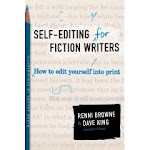Monday, January 25, 2010
A ROSE IS NOT A ROSE: NAMING CHARACTERS, Part 2
1. Choose names appropriate to the region and time where you character lives.
Left without direction, I invariably choose British last names: Johnson. Litchfield. Griffiths. I’ve learned to check what countries settlers in that region immigrated from to expand my national roots. Phone directories are another excellent resource for names. Also, records exist online for the most popular boys’ and girls’ names from the 1879 (http://www.ssa.gov/OACT/babynames/ ).
2. Choose names appropriate to the family background of your characters. Named for a saint? A biblical name? A family member? Puritan? Slave? Quaker? Hippie?
3. Consider nicknames and other derivatives of your character’s given name. My character Roger Pigeon hated his given name and the teasing that went with it, and reinvented himself as hard-nosed reporter Rocky Storm.
4. Choose a name in keeping with your character’s personality. The heroine of my Grace Gulch series is one of the three Wilde sisters—in name and in behavior. Keep in mind both the actual meaning of the name (found on any one of many baby name sites) and the public perception of the name (see The Baby Name Survey Book by Bruce Lansky and Barry Sinrod)
5. Choose names with different initials. A lot of writers choose alliterative names for families. Don’t. Keeping James, Jack and Joshua straight from each other is confusing not only for your reader but also for you. In Prodigal Patriot, I change my heroine’s name from Joshua to Steven to avoid confusion with the hero, Josiah. I often create a list, A to Z, and jot down names next to the letter used. That way, when I need another name, I focus on a letter not already in use. Another method is to experiment with the letters on a license plate; it forces you to use letters you might otherwise ignore.
6. Beware of using the same names repeatedly. I named a character in Romanian Rhapsody Michelle Morris and then named the heroine in Beacon of Love Judith Morris (changed to Morrison). The hero’s father in Prodigal Patriot is Ben; I named the hero’s best friend Ben in Bridge to Love before I discovered my error and changed it. Sammy appears in Romanian Rhapsody; Sam is the hero in Beacon of Love; and I wrote another book about “plain old Sam” (since changed to “ordinary Joe”). Help!
Here is my challenge:
Contemporary Your heroine has been raising her son alone since her husband was listed as Missing in Action. She owns a natural foods store. She is overly protective of her son and resents interference from well-meaning family members. She holds on to a hope her husband will return, although it’s been five years. She lives in Maine. If you can, use the initials “AS.” What’s her name?
Or feel free to share the story of how you named your characters, or ask about one you can’t find just the right name for.
Monday, January 18, 2010
A ROSE IS NOT A ROSE: NAMING YOUR CHARACTER Part 1
Romeo Montague may have told Juliet Capulet “"What's in a name? That which we call a rose by any other name would smell as sweet,” but the same does not hold true for the characters in our fiction.
For instance, can you imagine if the characters in Gone With the Wind exchanged names? If Melanie was the husband stealer instead of Scarlett, or if Rhett was the milquetoast instead of Ashley? Would the characters be as memorable with such mismatched names?
The right name can convey a lot about your character:
1) Family values—from “Prudence” among Puritans to “Moonshine” among Hippies, some names reveal significant information about your character’s background.
2) National heritage: Both first and last names convey a sense of the national heritage of the character. Consider Bridget, Guadalupe, LaShondra; or how about Schmidt, Lee (Li), Jones.
3) Sex: Although there are names that defy categorization.
4) Generation: More so for women than for men. Most popular names shift from year to year. “Linda” was the most popular girl’s name from 1950-1952; it had dropped off the top ten list by 1966.
5) Family relationships. Is he a junior? Or a 4th? Was she named for a relative who died?
Come back for Part 2, when I discuss some nuts and bolts of “how to” name characters. What went into naming my characters Lucy Ames, Cici Wilde, Magda Grace Mallory, Joey Carpenter and Judith Morrison?
For now, share the names of your favorite characters and let us know why you like the name.
Monday, January 11, 2010
Opening Lines Should Hook the Reader
Originally, I planned to discuss the topic of showing vs. telling for this blog post, but the very day I sat down to write it, my friend and mentor Cecil Murphey began a six-part series on that very subject. I knew I couldn’t compete with his excellent training, so I decided to point you in his direction with a hearty recommendation, and write about something else instead. You can subscribe to his blog, so you won't miss a single post.
Today, let’s talk about hooks – those opening lines that grab a reader’s (and editor’s) attention and makes them want to read more.
In 90% of the novels I’ve edited, and even one I’ve written, the words on paper started before the actual story began. The author usually introduces the character or the setting as a prelude to the action of the story.
We get the action rolling in our head, and think it’s necessary to bring the reader along with us. But we’re wrong. The reader wants to plop down in her recliner and start the story, right in the middle of the action, not spend a couple of pages getting ready to read. In today’s climate of instant gratification, you’ve got to hook the reader from the beginning, and keep them hooked.
Two ways to hook your reader:
• Dialogue. Just make sure it’s not a conversation between a dozen people the reader needs to know to understand.
• Information. Make the reader ask a question. You want them asking things like “Why?”, “What happened?” or “What’s next?” Or even, “WHAT?”
I pulled some novels off my shelf of favorites, and here are their opening lines:
Show business and death don’t mix. Unfortunately, I discovered this while hosting a TV cooking show. – Tough Cookie by Diane Mott Davidson
When the mood strikes me, the moon is just right, and the ocean behind my home is calm and calling me, I obey it and come. Just like Mama taught me to, quick and with no lip – I come, body naked, soul bared, water flowing ‘round my waist – and once again I am seventeen, innocent, unashamed. Not stuck in this sixty-some-odd-year-old body that plumps and hangs whichever way it pleases. – Trouble the Water by Nicole Seitz
I’ve always said the Lord had to drag me kicking and screaming to His altar, but once I got there I pitched a tent, unrolled my sleeping bag, and made myself at home. Anyone less patient than the Almighty would have zipped up that sleeping bag, sewn the top shut, and tossed me into the Dumpster in the back parking lot. – Just As I Am by Virginia Smith
That sunny September day was full of surprises. The first came when, after my realization that the sedan was still right side up and the windshield and windows intact, I turned off the ignition and turned to look in the back seat. – Some Buried Caesar (Nero Wolfe Mysteries) by Rex Stout
Don’t these make you ask questions? Make you want to continue reading?
Now it's your turn. We’d love for you to share your opening lines with us. Just leave 50 words or less of your opening, and we’ll critique them. To make for easy reading, please format it like this:
Your first name
Genre of novel
Working Title of Novel
The first 50 words or less of your novel’s first chapter.
We’ll let you know whether it hooked us, or whether it needs some work.
Happy writing!

Sunday, January 3, 2010
Goals for 2010
Writing-related goals may fall into several areas. What area is most important to you at this time? Finishing a project? Marketing your work? Improving your craft? Choose the area where you wish to concentrate in 2010.
An easy-to-remember anagram advises us to set S.M.A.R.T. goals.(1): Specific, Measurable, Achievable, Realistic, Timely.
Specific: Make your goal specific. Don’t say “I will write more.” Say, “I will finish Bridge to Love.” (That’s the title of my current WIP.)
Measurable: Make your specific goal measurable. “I will write 2,000 words a day” or “I will research and choose three agents to contact in the month of January.”
Achievable: Make your goal something within your control. I have no control over whether or not a publisher will buy my book or that it will become a best seller. However, I can say “I will write and submit Ohio Bound.”
Realistic: Make your goals realistic for the time you have to invest. Find your own rhythms. If pushed, I can write 1,000 words in an hour. Your average may be higher or lower. You may wish to set a time goal: I will write for 15—30 minutes a day before I go to bed. Make it realistic for your life.
Timely: Set your goals with a deadline in mind. I work back from a contract deadline to determine how much I need to do on a daily basis. That way, I rarely have last minute emergencies. Without a contract, use deadlines such as: conference attendance, contest entries, accountability partners to push you to reach your goal in a timely manner.
Set goals for the year—the month—the week—the day. Celebrate the successes. Readjust your goals in light of what didn’t work.
Come back in December ready to share your good news.
(1) Anagram not original with me—not sure where I first learned it.











